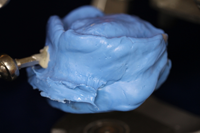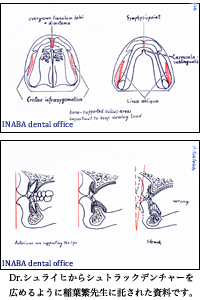2010年4月15日 « トップへ » 2010年4月19日
2010年4月17日
Do you recommend implants or full dentures for people in their 30s?
Q.I am in my late 30s but I have severe gingivitis. I only have 4 teeth in the upper left and only my front teeth on the bottom.
 My remaining teeth are loose and being held together by something like an adhesive. I currently use partial dentures with metal clasps. I have been to a few dental clinics hoping that they could do something for me.
My remaining teeth are loose and being held together by something like an adhesive. I currently use partial dentures with metal clasps. I have been to a few dental clinics hoping that they could do something for me.
At the first clinic they told me that my remaining lower teeth will all fall out so I have no option but to get dental implants.
The second clinic told me they could use my remaining 4 teeth to secure the upper denture, and they could put in a bridge after giving me 6 implants. They said it would cost quite a lot of money. It is so difficult for me to talk and to eat.
It has even begun to affect my job (I work in sales). I always carry a mask and I cannot laugh or smile in front of other people. Every day is tough. I am not sure if implants or full dentures would be a better for me. Which do you recommend?
A.It is possible that in the future you will need full dentures for the top and bottom.
The question is whether you should choose dentures or dentures that rely on implants. In your case it would be meaningless to use full dentures that rely on implants. Your implants are only as strong as your remaining teeth at the time you have them put it so you may have to go through the same ordeal again after a short while.
Also, considering the large number of implants that you would require and the fact that your bone is likely to thin out due to severe gingivitis, the burden on your bone would be too great.
By using a manufacturing method that utilizes the muscles around your mouth desirable results can be achieved without getting implants. This method is called the "maxillomandibular simultaneous impression method" and originates from Strack dentures developed in Germany.
 With this method we can take a molding of the upper and lower bite at the same time and gather all the necessary information about the inside of your mouth. You will have to swallow some saliva while the mold is being taken but dentures made using this method will allow you to enjoy eating the same way that you used to before losing your teeth. The adhesion of dentures supported by muscles in your mouth is very strong. We make sure that they will not come out by using the water film phenomenon (this is when water is placed between 2 layers of glass making them difficult to separate).
With this method we can take a molding of the upper and lower bite at the same time and gather all the necessary information about the inside of your mouth. You will have to swallow some saliva while the mold is being taken but dentures made using this method will allow you to enjoy eating the same way that you used to before losing your teeth. The adhesion of dentures supported by muscles in your mouth is very strong. We make sure that they will not come out by using the water film phenomenon (this is when water is placed between 2 layers of glass making them difficult to separate).
Strack dentures are superior both functionally and esthetically.
 It is unfortunately true that people who have lost all of their teeth and have suffered from thinning bone often have an emaciated and elderly look to the area around their mouths.
It is unfortunately true that people who have lost all of their teeth and have suffered from thinning bone often have an emaciated and elderly look to the area around their mouths.
Strack dentures can add volume from inside of the mouth that can be adjusted to give you the look that you want by using the maxillomandibular simultaneous impression method. You can regain your vibrant youthful smile.
Since implants are implanted into the thick inner part of our bone, it is very difficult to reproduce the exact positioning of your teeth and it is impossible to add volume to your smile.
People who get dentures tend to get shy and lose their ability to enjoy every day. Needless to say, the mouth is not just for eating but it is also important for communication. But our dentures are so natural feeling that you will forget that you are even wearing them.
Moreover, there is another technique, also developed in Germany, known as 'Resilience telescope' that can be used in case you still have a few teeth remaining.
My jaw has gotten worse since having dentures made.
Q. I spent 2 years having my teeth treated. I had partial dentures with metal parts made for my remaining upper teeth and I have silver fillings in my lower teeth that have received nerve treatment. After treatment the condition of my jaw has only gotten worse.
I feel pain in the joints around my jaw every time I eat. I have noticed a crumbling sound when I open my jaw wide. Every morning the area around my neck is stiff and it has become difficult to raise my arms. I also get headaches frequently. My family always tells me that I look tired. I wonder if the cause of my problems is that my dentures don't fit. It worries me and I would like to come in for consultation. (woman in her 50s)
A. "I cannot open my jaw widely", "The joints in my jaw hurt", and upon follow up questioning many say, "My neck hurts", "I have stiff shoulders", "My back hurts", "My hands and legs go numb", "My ears are ringing", "I get bad migraines". These symptoms are common in patients in their 50s, 60s and 70s.
TMJ arthrosis is a condition in which the area around the jaw hurts, and opening the mouth becomes difficult. Conventionally it is considered an ailment common in people in their 20s and 30s but in recent years the number of patients in their 50s and 60s suffering from TMJ arthrosis has been increasing quickly.
It is believed that the main cause of TMJ arthrosis in people in their 50s and 60s is unbalanced bite alignment caused by dentures.
In order to adjust the balance of one's bite alignment, the upper and lower dental mold must be centered symmetrical down the center of the body. This mold is then placed into a bite alignment device and examined. It is extremely important to create dentures that match perfectly to the data retrieved through this method.
However, conventional dentures covered by health insurance are often unable to meet these acute specifications and it has often been observed that continuing to eat with such dentures only serves to worsen the problem.
Here at Inaba Dental Office we are able to accurately create a bilateral symmetrical plane with 'Riegel telescope', dentures first developed in Germany, the leading country in dental technology. With this technology we can provide the most effective treatment available for patients suffering from TMJ arthrosis.
After treatment, patients experience the same plane symmetry from when they still had all of their teeth, even though they are wearing dentures. Pain in the jaw joints is relieved and accompanying symptoms such as stiff shoulders and ringing in the ears improve over time.
First it is necessary to have the balance of your bite alignment examined.
2010年4月15日 « トップへ » 2010年4月19日









